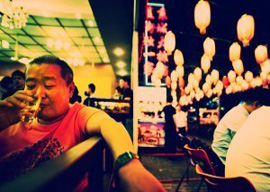
February 28, 2013

The men are fighting back, though:
Their [i.e., female public health professionals] efforts met with only limited success…while the women opened up a space for alcohol to play a diminished role in the building of guanxi, they did not eliminate the perceived necessity, for both sexes, of banqueting.
Ms. Mason describes some of the stratagems Chinese professional women use to avoid drinking”mixing tea with their liquor when no one’s looking, and so on. (This particular genre of deceit has some history outside China. Robert Graves, in Good-Bye to All That, tells us that his German grandfather, “as student at the university ‘drunks,’ had a habit of pouring superfluous beer into his eighteen-fortyish riding boots when nobody was watching.”)
Her piece also has a heroine, Dr. Wu, “the head of a large department.” Dr. Wu is quite the Calamity Jane:
Wu’s advancement was widely seen as resulting directly from her prodigious drinking capabilities, and often she was invited to sit at the “leaders’ table,” due to her “high capacity for alcohol.” I frequently saw her drink more than a dozen shots of liquor at lunch, go back to her office and work, and then repeat the same exercise, with greater volumes of liquor, in the evening.
The bad news is that the Chinese have taken to automobiles in a big way, with corresponding public campaigns against drunk driving. This may kill off banquet toasting rituals as it killed off the English country pub, or the self-driving automobile may arrive in time to save the day for untamed masculinity.
Ms. Mason’s piece is the more amusing for being written in a tone of mild indignation and in the plonking diction of academic feminism”“gendered norms,” “embodying emotion,” and the rest. For me at least this added a flavor of unintentional humor to the article. How can you not smile to read of Ms. Mason “grasping with my body women’s experience of banqueting”?
Temperamentally I am with the guys here, but I suppose the women will win this one, as they win them all sooner or later. The world will then be safer and more sober, but less fun. Isn’t that what women are for?
(Housekeeping note: If you emailed me at any time in the past nine months, I may owe you an apology: see here.)